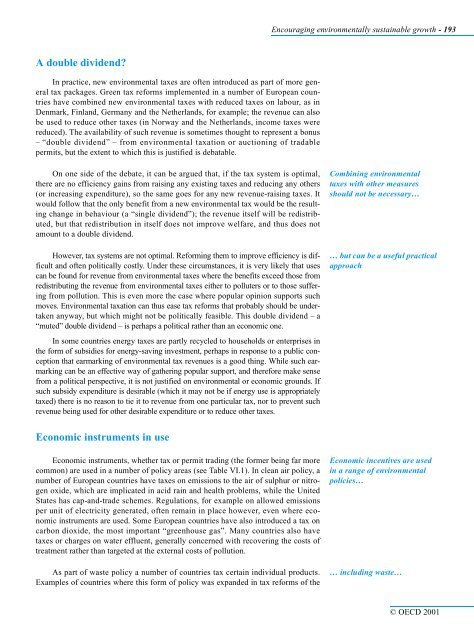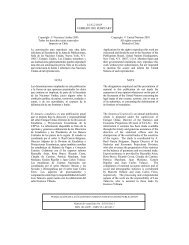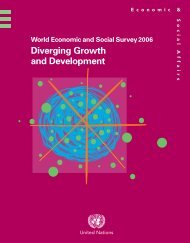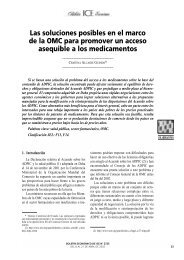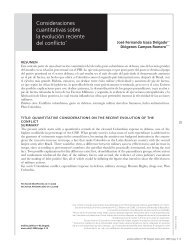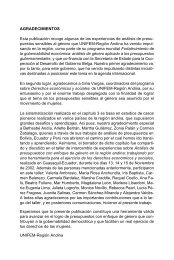OECD Economic Outlook 69 - Biblioteca Hegoa
OECD Economic Outlook 69 - Biblioteca Hegoa
OECD Economic Outlook 69 - Biblioteca Hegoa
You also want an ePaper? Increase the reach of your titles
YUMPU automatically turns print PDFs into web optimized ePapers that Google loves.
A double dividend?<br />
In practice, new environmental taxes are often introduced as part of more general<br />
tax packages. Green tax reforms implemented in a number of European countries<br />
have combined new environmental taxes with reduced taxes on labour, as in<br />
Denmark, Finland, Germany and the Netherlands, for example; the revenue can also<br />
be used to reduce other taxes (in Norway and the Netherlands, income taxes were<br />
reduced). The availability of such revenue is sometimes thought to represent a bonus<br />
–“double dividend” – from environmental taxation or auctioning of tradable<br />
permits, but the extent to which this is justified is debatable.<br />
On one side of the debate, it can be argued that, if the tax system is optimal,<br />
there are no efficiency gains from raising any existing taxes and reducing any others<br />
(or increasing expenditure), so the same goes for any new revenue-raising taxes. It<br />
would follow that the only benefit from a new environmental tax would be the resulting<br />
change in behaviour (a “single dividend”); the revenue itself will be redistributed,<br />
but that redistribution in itself does not improve welfare, and thus does not<br />
amount to a double dividend.<br />
However, tax systems are not optimal. Reforming them to improve efficiency is difficult<br />
and often politically costly. Under these circumstances, it is very likely that uses<br />
can be found for revenue from environmental taxes where the benefits exceed those from<br />
redistributing the revenue from environmental taxes either to polluters or to those suffering<br />
from pollution. This is even more the case where popular opinion supports such<br />
moves. Environmental taxation can thus ease tax reforms that probably should be undertaken<br />
anyway, but which might not be politically feasible. This double dividend – a<br />
“muted” double dividend – is perhaps a political rather than an economic one.<br />
In some countries energy taxes are partly recycled to households or enterprises in<br />
the form of subsidies for energy-saving investment, perhaps in response to a public conception<br />
that earmarking of environmental tax revenues is a good thing. While such earmarking<br />
can be an effective way of gathering popular support, and therefore make sense<br />
from a political perspective, it is not justified on environmental or economic grounds. If<br />
such subsidy expenditure is desirable (which it may not be if energy use is appropriately<br />
taxed) there is no reason to tie it to revenue from one particular tax, nor to prevent such<br />
revenue being used for other desirable expenditure or to reduce other taxes.<br />
<strong>Economic</strong> instruments in use<br />
<strong>Economic</strong> instruments, whether tax or permit trading (the former being far more<br />
common) are used in a number of policy areas (see Table VI.1). In clean air policy, a<br />
number of European countries have taxes on emissions to the air of sulphur or nitrogen<br />
oxide, which are implicated in acid rain and health problems, while the United<br />
States has cap-and-trade schemes. Regulations, for example on allowed emissions<br />
per unit of electricity generated, often remain in place however, even where economic<br />
instruments are used. Some European countries have also introduced a tax on<br />
carbon dioxide, the most important “greenhouse gas”. Many countries also have<br />
taxes or charges on water effluent, generally concerned with recovering the costs of<br />
treatment rather than targeted at the external costs of pollution.<br />
As part of waste policy a number of countries tax certain individual products.<br />
Examples of countries where this form of policy was expanded in tax reforms of the<br />
Encouraging environmentally sustainable growth - 193<br />
Combining environmental<br />
taxes with other measures<br />
should not be necessary…<br />
… but can be a useful practical<br />
approach<br />
<strong>Economic</strong> incentives are used<br />
in a range of environmental<br />
policies…<br />
… including waste…<br />
© <strong>OECD</strong> 2001


